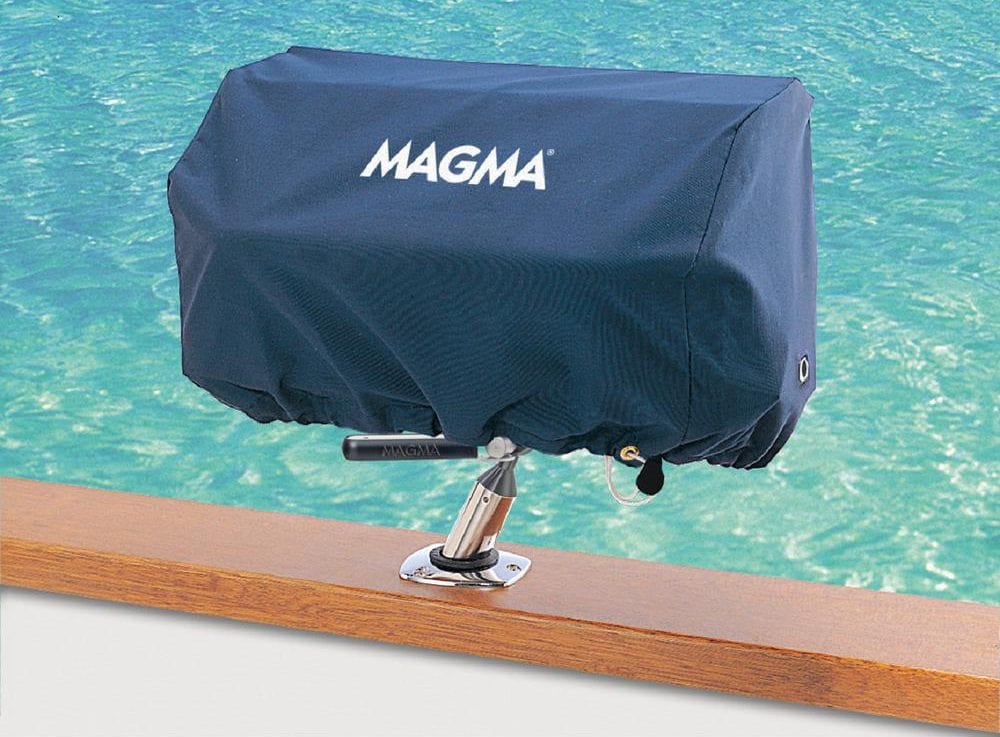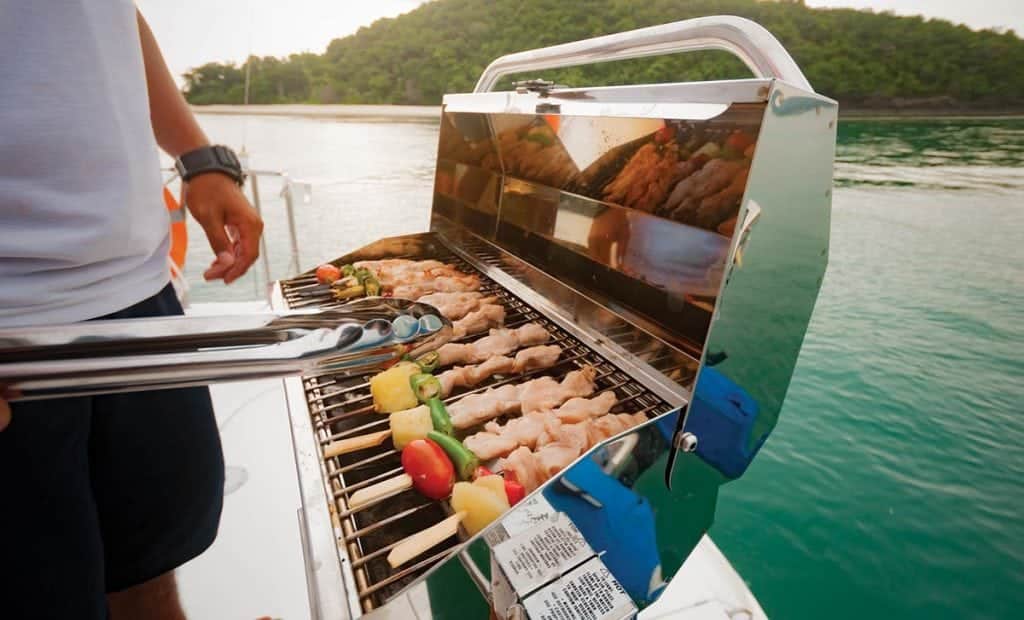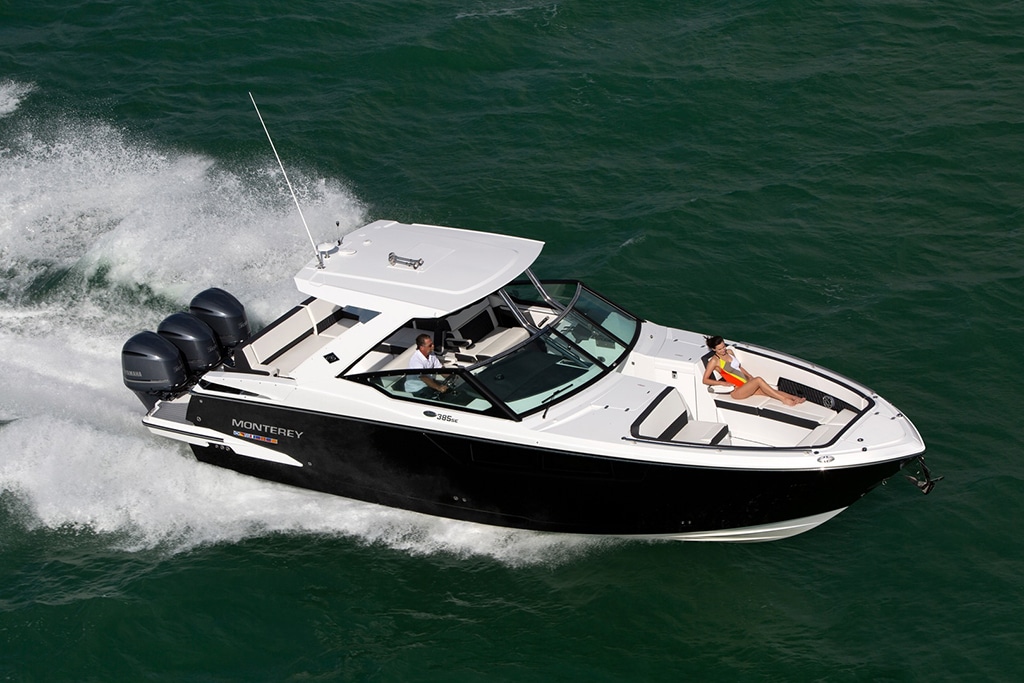Set the party on fire (and not your boat) with these grill safety tips
The aroma of burgers wafts through the evening air; hot dogs and brats hiss and pop as they near peak perfection, and the color of peppers on kabobs become charred as they soften. What’s not to love about firing up the barbecue after a long day on the water? Maybe a fire? That won’t happen with these grill safety tips.
Because grills are located above decks, boaters tend to treat them with a more cavalier attitude when it comes to safety—bad move. According to the Insurance Information Institute, barbecues result in more than 2,000 fires, more than 300 grill-related injuries, and at least 3 deaths annually. Here’s a look at how to keep “the king of coals” from becoming a barbecue statistic.
All types of grills—charcoal, liquid propane gas (LPG) and electric grills—come with their own pros and cons:
Grill Types
Charcoal grills can be a challenge to light but stay lit in even the strongest winds—a good thing for cooking yet a minus in the event of an emergency such as accidentally spilling those hot coals. They’re also messy to use and clean, fuel storage can be a pain, and you’ll have to refill them during extended grilling periods.
Gas grills are easier to light, clean, offer better temperature control, but are more difficult to keep lit in a stiff breeze.
Electric grills offer all of the above less the worry about them going out, yet require a source of AC power, which means having a generator on board or dock-only usage.
Prior to installation, determine where the grill will be used: clamped to the cockpit railing or use with a fishing rod-style mount. Choose a location clear of flammable items so that the grill doesn’t interfere with hatches, dinghy davits, etc. If removable, think about where to stow it after use, and where to safely store the fuel above decks.
Tips of the Trade
While electric grills also have safety requirements, the following tips mainly concern charcoal and gas grills (due to their use of combustion). Consider these general, commonsense precautions that can be applied when using most any grill:
• Read the owner’s manual. Find information on everything from assembly to safe operation tips. Still have questions? Don’t be shy—give the manufacturer a call to clarify. (Write their consumer service phone number on the manual’s front page for easy reference.)
• Always grill above decks in an open area. Barbecue grills are designed for above deck use in a well-ventilated area. Never barbecue down below in the galley or inside an enclosed area, such as the cockpit with full canvas curtains in place. In both cases, carbon monoxide can accumulate with lethal results.
• Securely mount your grill before use. Ensure your grill is firmly mounted in place and stable. Never use portable, camping-type grills, which can easily slide around or tip over. Grills should also be mounted where people and pets can’t accidentally come in contact with them. Never try to move a hot grill. Instead, allow the grill to become completely cool to the touch before trying to relocate or stow it.
• Keep it under control. Never leave a grill unattended during use and always keep some method of fire control nearby such as a portable fire extinguisher, fire bucket (with a lanyard long enough to reach the water), fire blanket, etc. A spritzer bottle of water can help with minor flare-ups, but remove food from the grill first if possible. Cleaning your grill regularly to remove grease and fat buildup reduces the chances of fire and flare-ups as well.
• Use proper grilling utensils. Use of long-handled barbecue utensils (tongs, forks, etc.) helps reduce burns due to pops and splatters.
• Wear grill-safe clothes. No thongs, speedos or “au naturel” grilling, please. On the flip side avoid baggy, frilly clothes and loose, billowing shirts or bikini wraps that can catch fire.
Charcoal grill safety tips
1. If you use starter fluid, use only charcoal starter fluid. Never use gas from the dingy jerry can or add charcoal fluid or any other flammable liquids to the fire once started. Charcoal chimney starters allow you to start charcoal using newspapers, etc., without the need for starter fluid.
2. When you’re done grilling, let the coals cool completely before disposal.
LPG grill safety tips

2. Properly mount the grill outside in a well-ventilated area before connecting the cylinder.
3. Always disconnect and remove the LPG cylinder after use. If the grill is stored below decks, always remove the LPG bottle before stowing.
4. Store LPG bottles above decks in a well-ventilated area where escaping vapors can only flow overboard. LPG must be protected from the elements and other mechanical damage. Possible options include a PVC tube holder or a non-corrosive bag properly mounted to the stern railing (well away from the grill of course).
5. Never lean over the grill when lighting (or cooking for that matter), and keep the lid open to prevent flare-ups from gas build-up.
— By Frank Lanier, Southern Boating Magazine April 2016














